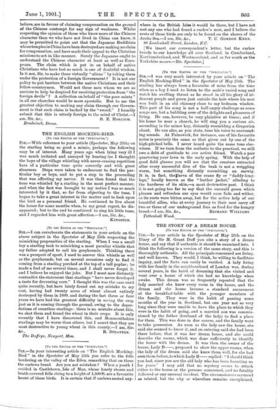[To THE EDITOR OF THE "SPECTATOR."1 was very much interested
by your article on " The English Mocking-Bird" in the Spectator of May 25th. The starling has always been a favourite of mine from the time when as a boy I used to listen to the male's varied song and watch his swelling throat as he stood in all his glory of iri- descent purple and green just outside the hole where his nest was built in an old chimney close to my bedroom window. This part of his song is not a half-angry challenge as some songs are, but a bubbling over of the delights and pleasures of living. He can, however, be very plaintive at times; and if his home be near a church, he will sing you a curious air, ascending in the minor key, distantly resembling a Gregorian chant. He can also, as you state, tune his voice to surround- ing sounds. At Painswick, for instance, one of his favourite notes is precisely the same as that given out by one of the high-pitched bells. I never heard quite the same tone else- where. If we turn from the I:esthetic to the practical, we still owe a debt of gratitude to our active friend. Watch a pair quartering your lawn in the early spring. With the help of good field glasses you will see that the creature extracted after every successful dive of the beak is not a wriggling worm, but something distantly resembling an earwig. It is, in fact, thdlarva of the crane fly or " daddy-long- legs," locally known as the "leather jacket," alluding to the hardness of its skin,—a most destructive pest. I think it is not going too far to say that the emerald green which pleases and refreshes our eyes would soon fade and wither, as its roots were bitten away, but for the active help of our beautiful allies, who at every journey to their nest carry off two or three of our underground foes as food for the hungry






































 Previous page
Previous page